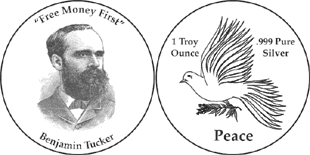Split from UAE port deal: statism vs. anarchism
Posted: Fri Feb 24, 2006 1:52 pm
This thread has been split from the UAE port deal thread. Please continue only the statism derailment here and only the port deal discussion there.
-- Sav, Politics moderator
___________________________________
-- Sav, Politics moderator
___________________________________
?? I sure a hell didn't create Bush, or any other ruler. If you mean that those foolish enough to condone the State by voting bear some moral culpability, then I agree. But their culpability is miniscule compared to the rulers and the goons who carry out the rulers' violence.Doug wrote:But we, the United States, did create the rulers we have now.
Here I strongly disagree. Normal (non-ruling) Americans should not accept blame for the immoral conduct of the ruling elites. That's simply a way to divert blame from the actual perpetrators. If you convince the dumb masses that everybody did it, then no one can be held responsible. This whole "we are the government" thing is a way for rulers to shirk moral culpability. Accepting responsibility for things you didn't do and didn't approve of is a cop-out - it is being too cowardly and self-deluded to accept the fact that rulers (not everybody in general) made the decisions and are responsible for the mass-murders in Iraq, etc.Doug wrote:We should not try to absolve ourselves of blame for allowing Bush to ascend to power by passing it off as "THEY."
Yes, and one thing we can do to make our country better is to do more to destroy the State. Our country, our geographical region, is one thing; the institution that rules us, the organization of legitimized plunder, is another. (One Orwellianism is the rulers' attempt to equate "country", "nation", and "State." Politicians like to exploit man's social "hard-wiring" - the residual evolved esprit-de-corps of the inbred super-families of the hunter-gatherer period - for nefarious purposes.) My country is Ozarkia. One way I try to make my country better is by doing all I can to destroy the aura of legitimacy of the State.Doug wrote:We all need to do more to make our country better.
"We" have not done evil; the USEmpire's rulers have. The ports may be run by enemies of the US ruling elite, not enemies of you or I or most American people. Barbara, you are not, I repeat not, part of the Bush ruling junto. Please don't fall for the slave "we". You did not shoot rockets into civilian neighborhoods in Fallula - hired "milfare" murderers did it on the orders of US ruling assholes.Barbara wrote:We also cannot condone stupid behavior (handing over our ports to supporters of our enemies) because we have done stupid or evil (and I go with evil) things ourselves.

